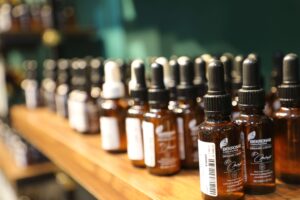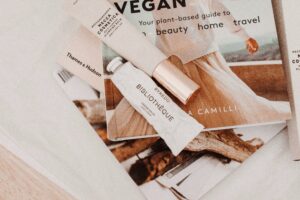Beyond the Misconceptions

In the ever-evolving landscape of beauty, the demand for cruelty-free products has gained significant traction. However, amidst the rise of ethical beauty practices, myths and misconceptions often cloud the understanding of what it truly means to be cruelty-free. In this enlightening beauty blog, we will debunk common myths surrounding cruelty-free beauty, offering clarity and empowering consumers to make informed and compassionate choices.
Myth 1: “Cruelty-Free Means Sacrificing Product Performance”
One prevailing myth suggests that cruelty-free products may not perform as well as their non-cruelty-free counterparts. The reality is quite the opposite. Numerous cruelty-free brands invest in cutting-edge formulations and innovative ingredients, delivering products that not only meet high ethical standards but also excel in performance. From skincare to makeup, cruelty-free options are celebrated for their quality and effectiveness.
Myth 2: “Cruelty-Free Brands Are Limited and Hard to Find”
Contrary to the belief that cruelty-free brands are scarce, the beauty industry has witnessed a significant surge in ethical alternatives. Many well-established brands, both mainstream and independent, proudly uphold cruelty-free values. The challenge lies not in availability but in awareness. With dedicated apps, websites, and communities, discovering cruelty-free brands has become more accessible than ever.
Myth 3: “Cruelty-Free Beauty Is Expensive”
A common misconception is that cruelty-free products are generally more expensive. While some high-end cruelty-free brands may have premium price points, affordable options abound. Drugstore brands, online retailers, and budget-friendly lines offer a diverse range of cruelty-free products, ensuring that ethical beauty is accessible to consumers with varying budgets.
Myth 4: “Cruelty-Free Only Applies to Makeup”
Another myth is that cruelty-free beauty is limited to makeup products. In reality, the cruelty-free movement spans across all beauty categories, including skincare, haircare, and personal care items. Brands committed to ethical practices extend their cruelty-free commitment to every facet of their product offerings, allowing consumers to build an entire cruelty-free beauty routine.
Myth 5: “Cruelty-Free Products Lack Certification”
There’s a misconception that unless a product carries a cruelty-free certification logo, it cannot be considered cruelty-free. While certifications from organizations like Leaping Bunny and PETA are valuable indicators, some smaller cruelty-free brands may not undergo the certification process due to resource constraints. Researching a brand’s cruelty-free status through other reliable sources, such as brand statements and cruelty-free lists, can provide assurance.
Myth 6: “Cruelty-Free Brands Are Less Transparent About Ingredients”
The belief that cruelty-free brands are less transparent about their ingredients is unfounded. In fact, many cruelty-free brands prioritize transparency and openly disclose their ingredient lists, formulations, and sourcing practices. Consumers can access detailed information on cruelty-free brands’ websites, ensuring they make informed choices based on their values and preferences.
Myth 7: “Cruelty-Free Products Are Less Innovative”
Some mistakenly assume that cruelty-free brands lag behind in innovation. On the contrary, ethical beauty brands often lead the way in adopting innovative and sustainable practices. From cruelty-free and vegan formulations to eco-friendly packaging, these brands actively contribute to the evolution of the beauty industry, setting new standards for creativity and sustainability.
Myth 8: “Cruelty-Free Products Don’t Follow Global Standards”
Another prevalent myth suggests that cruelty-free products may not adhere to global standards, particularly if they are sourced or manufactured in regions with lax animal testing regulations. However, cruelty-free brands with a commitment to ethical practices ensure that their entire supply chain, including ingredient sourcing and manufacturing, aligns with cruelty-free principles.
Myth 9: “Cruelty-Free Means Sacrificing Trendy or High-End Options”
Some consumers believe that cruelty-free beauty limits their access to trendy or high-end options. The truth is that an increasing number of luxury and trendy brands are embracing cruelty-free practices. From renowned fashion houses to indie beauty labels, cruelty-free options cater to diverse tastes, allowing consumers to indulge in the latest trends without compromising their values.

Myth 10: “Cruelty-Free Labels Are Just Marketing Tactics”
A common misconception is that brands use cruelty-free labels solely as marketing tactics, without genuine commitment to ethical practices. While it’s essential to remain discerning, cruelty-free certifications from recognized organizations validate a brand’s dedication to cruelty-free principles. Many brands view their cruelty-free status as a core value, embracing transparency to build trust with consumers.
As the cruelty-free beauty movement continues to flourish, dispelling myths is vital for fostering informed and empowered consumer choices. Cruelty-free beauty isn’t a compromise; it’s a celebration of ethical practices, innovation, and accessibility. By debunking these myths, we invite beauty enthusiasts to explore the vast landscape of cruelty-free options, embracing a future where compassion and conscientious choices define the beauty industry. Let the truth behind cruelty-free beauty illuminate your path to a more ethical and beautiful tomorrow.




